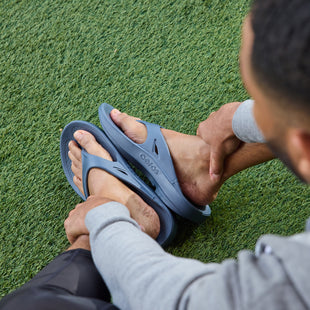
TOM CRAGGS
Tom Craggs is an England National Team Coach and has a fantastic record of coaching runners from beginners right through to elites including some of the UK’s most well-known runners.

ALEXANDRA COOK
Alexandra Cook has 13 years of experience as a sports dietician and is also a UKA athletics coach. She is also a competitive distance runner with 20 years of experience which means she can provide realistic advice as an endurance athlete herself.
TOM CRAGGS' MARATHON TRAINING TIPS
Too long, too tired – Whilst it is important to have banked some good time on feet in your longest long runs if you go too long you’ll struggle to recover and start your marathon already tired. Nothing magical happens at 20 miles in a training run.
Try this – 3 hours 10-20 minutes is as long as you should be out on feet for in your longest run. Any more than that and you risk not recovering in time. If that gets you to 20 miles, great but many runners ruin good marathons by trying to get to 22-24 miles in training and see the wheels coming off at mile 18 in the marathon.
Pace practice – When the gun goes on race day you need to have an idea of what pace you’ll be running, March and April are the months where this starts to become clear. Adding a touch of marathon pace to the end of some of your key long runs is a great mental and physical stimulus. A great peak long run might be 2 hours 45 minutes – 3 hours 15 minutes to include 4 sets of 20 minutes at goal marathon pace with a 5-minute steady recovery.
Try this – There are a range of ways to guide you on your marathon pace. Times your 10km PB by 5, minus 10 minutes is one option, doubling your half marathon time and adding 10-20 minutes or around 105-108% of your half marathon time are all good options.
Get energised – Fuelling on the run is a really good way to ensure you get to the final 10km of the marathon strong and ready to hold your pace. It takes practice though and the next few weeks are when you need to practice your race day fuelling strategy.
Try this – Gels are an incredibly affective what to get energy quickly into your body on the run but most people try to neck them back all in one go. Sip your gel gradually over 3-4 minutes and target one gel after 45 minutes then one every 30 minutes or so thereafter. If you struggle with gels, ensure you try a range of other options well in advance of your taper.
Getting the basics right – ‘The basics’ – this is what I call the little things that glue your training together. Routine stretching, core, snacking healthily and getting into a good bed time routine is crucial this month and they are often the first things to go as you get more tired and up the running volumes.
Try this – Sit down for 10-15 minutes and write down your own top 5 personal recovery commitments. 5 things that you will do each week to look after your body and keep recovering well. It could be a yoga class, refuelling quickly after your runs, turning your phone off an hour before bed. Note them down and assess each week whether you have taken one step close to them, or s step further from them!
Find your bubble – March can be a month of comparisons if you are not careful – spending your day on social media seeing what every other runner has been doing won’t help you and your marathon and is only likely to stress you out. We are all different, have different physiology, goals and available training time. Stay confident and consistent on YOUR plan this month.
Try this – Look back over your training diary and remind yourself of those key positives you have banked so far. If you feel you are a little behind remember you are better to be 10% under trained than you are 1% over trained for your marathon so don’t panic train to back fill missed runs.
Mimic race day – Feeling psychologically primed and ready is a key weapon and race day and you should think about working on this too over the next 6 weeks. Race day should feel familiar, this will allow you to stay calm and focused.
Try this – Aim to have a couple of your key runs where you aim to mimic your planned race day routines, run at the time the race starts, wear your race day kit and have your race day breakfast. Try out a few different positive self-talk techniques – these could be focused on relaxation (“breath and relax your shoulders”), giving yourself instructions (“keep your leg speed up and snappy”), getting motivated (“I’ll dedicate this mile to XX person””), or getting focused (“Pull in that vest in front!”).
ALEXANDRA COOK'S MARATHON NUTRITION TIPS
What do people need to eat to refuel after a long run?
Balance is key and it’s not just focusing on one nutrient. If you follow the 3 R’s rule you will ensure you are nailing your recovery every time.
Rehydrate with water or / and electrolyte drink. You need to take on fluid at a rate that you are not peeing it straight out! As soon as you have finished your run drink 500mls fluid. After that, drink little and often until urine is clear or you have reached your pre-run weight.
Refuel with carbohydrate but no need to over compensate! If you have 24 hours between sessions, your strategy can be a little more relaxed. Follow your daily carb needs appropriate for your level of activity and ensure a well-balanced meal within an hour of finishing exercise. A well-balanced meal is hitting all the main food groups, a portion of protein, carbohydrate and a half a plate with veggies or salad. Simple but effective!
If you have less than 8 hours between sessions, or you have done a gruelling fasted sessions this is where you need to be more exact. Take approximately 1g carbs / kg of body weight each hour for 3-4 hours to maximise glycogen synthesis. This way you will ensure your glycogen stores are as restored as much as possible for the next session.
Rebuild with protein. Protein is not essential for the immediate post session recovery but plays a large part in long term recovery and adaptation to training. Therefore, getting into the habit of having approx. 20g protein 60 – 90 mins post run, then same again for subsequent meals to get your recovery right.
How soon after your long run should you eat?
This really depends on when your next training session is. If you have less than 8 hours before your next session then you need an immediate post run snack within 30 mins of finishing followed by a balanced meal in the next hour or so.
The sooner you eat the faster you will replenish those depleted glycogen stores ready for your next session. However, most of us have at least 24 hours before our next run therefore we have longer to get fuel stores replenished. As long as you are eating a balanced meal within 60-90 mins of finishing your run and continue to eat adequate carbs for the remainder of the day meeting your daily training requirements, you will ensure you are well recovered for your next run.
An endurance runners should have anything between 3-12gs of carb per kg of your body weight. Depending on your training load will depend on how much you need. For example, if you are doing approximately 1 hour of exercise a day, you should be aiming for 5-7g of carbohydrate per kg of body weight. So, for a 70kgs runner this would be between 350-490g of carbohydrate per day. The higher the training volume, the higher the demand for carbohydrate.
Do people need to consider what they should eat straight after short, hard training runs like interval sessions or tempo runs, or can they get what they need to support their training from their regular diet?
High intensity training can deplete your glycogen stores quickly so runners must still be attentive to refuelling strategies after these types of sessions. What is most important though is looking at your training around the session. If you have 24 hours or more to recover before your next session then a post training meal within an hour or so of finishing will be adequate to kick start the recovery process but if you are training again sooner then have a carb and protein rich snack straight after your session followed up by carb rich meals and snacks to ensure glycogen reserves are replenished before your next run.







